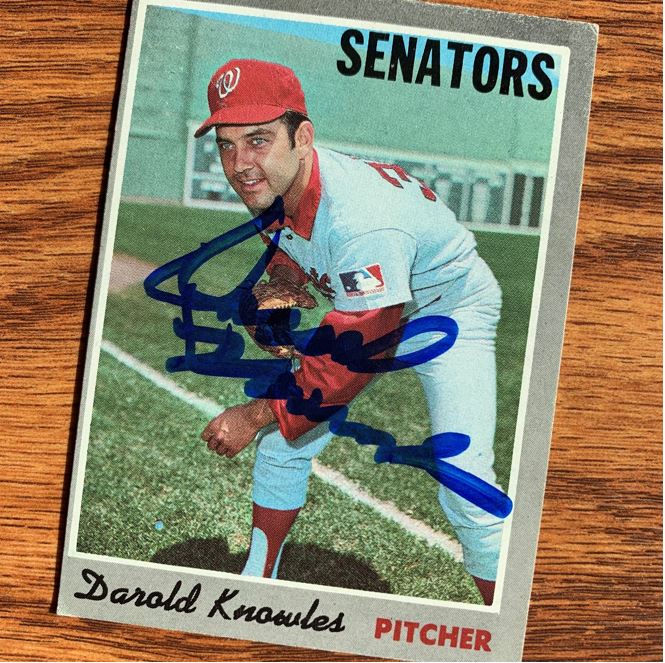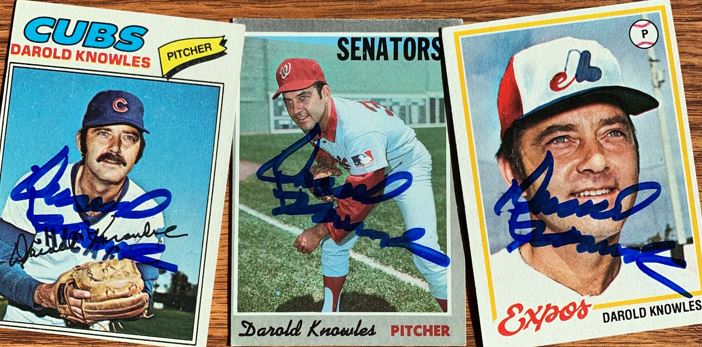
TTM Stats
- Sent: 4/12/2022 | Received: 4/29/2022 | 17 Days
- ’70 Topps, ’77 Topps, ’78 Topps
- Address: Home (address from Sports Card Forum)
The Story of the Autograph
Darold Knowles’s baseball journey was defined by consistency, reliability, and versatility. As one of the first true specialists in relief pitching, Knowles built a distinguished career that spanned three decades, and he became one of the most trusted arms in the game during his time. Known for his calm demeanor and ability to deliver under pressure, Knowles made history as part of the Oakland Athletics’ dynasty of the early 1970s, earning a place in baseball lore.
Darold Duane Knowles was born on December 9, 1941, in Brunswick, Missouri. He grew up in a sports-loving family and quickly gravitated toward baseball, demonstrating a natural talent on the mound. After high school, Knowles played college baseball and signed with the Baltimore Orioles in 1961, beginning his journey in the minor leagues. He made his major league debut with the Orioles in 1965, playing in five games that season.
Knowles was traded to the Philadelphia Phillies after the 1965 season. He started his career as a reliever, showcasing a knack for keeping hitters off balance with his control and poise. His early success soon earned him a permanent place in the major leagues.
Following his first two seasons, Knowles was traded to the Washington Senators in 1967. It was in Washington that he began to establish himself as a reliable relief pitcher. Over four seasons with the Senators, Knowles demonstrated his ability to handle high-leverage situations, leading the team in saves and solidifying his role as a bullpen workhorse. In 1969, Knowles was selected to the All-Star Game, a testament to his growing reputation as one of the league’s top relief pitchers.
In an era when starting pitchers were expected to complete games, Knowles was a pioneer in the evolving role of relievers. Managers recognized his value in preserving close games, and his consistency made him a trusted arm for tight situations. His success with the Senators caught the attention of the Oakland Athletics, who acquired him in a trade in 1971.
Knowles joined the Oakland Athletics during one of the most successful periods in franchise history. The A’s were an emerging powerhouse in the American League, and Knowles became an essential part of their bullpen. His performance during the A’s 1972 season was instrumental in helping Oakland reach the World Series, where they faced the Cincinnati Reds.
The 1973 season would prove historic for Knowles, as he became the first pitcher to appear in all seven games of a World Series, facing the New York Mets. His reliability and stamina were key factors in the Athletics’ victory, helping them secure their second consecutive championship. That postseason performance further solidified Knowles’s reputation as one of the best relief pitchers in the game.
Knowles played a crucial role in the A’s three-peat, as the team won the World Series again in 1974. His ability to handle high-pressure situations and deliver key outs made him invaluable to Oakland’s championship success.
After his success with the A’s, Knowles continued to be a valuable asset in the bullpen as he moved to other teams, including the Chicago Cubs, Texas Rangers, Montreal Expos, and St. Louis Cardinals. By the time he retired in 1980, he had appeared in 765 games, with 143 saves and a career ERA of 3.12—a testament to his consistent effectiveness over his 16-year career.
Following his retirement as a player, Knowles transitioned to coaching, where he shared his knowledge and experience with younger pitchers. He served as a pitching coach for several major and minor league teams, including a stint with the St. Louis Cardinals. His expertise, especially in relief pitching, was invaluable to the players he mentored, as he was able to offer insights from his unique perspective as a bullpen specialist.
Darold Knowles’s career paved the way for future generations of relief pitchers. At a time when bullpen roles were still evolving, Knowles showed how a dedicated reliever could make a significant impact, especially in postseason play. His seven-game appearance in the 1973 World Series remains a remarkable achievement, demonstrating the endurance and resilience required for a reliever to contribute so consistently on the game’s biggest stage.
Today, Knowles is remembered not only for his contributions to the Athletics’ championship teams but also for his role in changing how relief pitching was viewed in baseball. He set a standard for consistency and dependability in the bullpen that has influenced countless relievers who followed in his footsteps.
Beyond baseball, Knowles is known for his humility and love of the game. He has often expressed gratitude for the opportunities he had in his career, particularly the chance to play with the legendary Oakland A’s team and compete in multiple World Series. He also values the relationships he built throughout his career, as well as the chance to help develop young pitchers during his coaching days.
Now retired from coaching, Knowles occasionally shares his insights and memories with fans, reflecting on a career that has left a lasting impact on baseball. His journey from a small town in Missouri to the heights of World Series glory is a testament to hard work and dedication. His legacy, especially as a trailblazer in relief pitching, continues to be remembered by fans of the game.
The Score on Darold Knowles – 7.5


Darold is a great signer and always seems to use a great marker. It’s like his… signature (LOL!). Anyway, these came out great as they all gave him a pretty good place to sign. I especially like the 1977 Topps and 1978 Topps cards because of how the blue goes with those uniforms.
Thanks Mr. Knowles! I’m giving this return a 7.5.
This is my third successful return from him. To see the other returns, check out these posts:

>>> READ MORE ABOUT MY AUTOGRAPH SCORING SYSTEM <<<
Thanks for visiting BravestarrCards.com: Card Collecting and TTM Autographs.
Information gathered using Wikipedia and Baseball Reference.